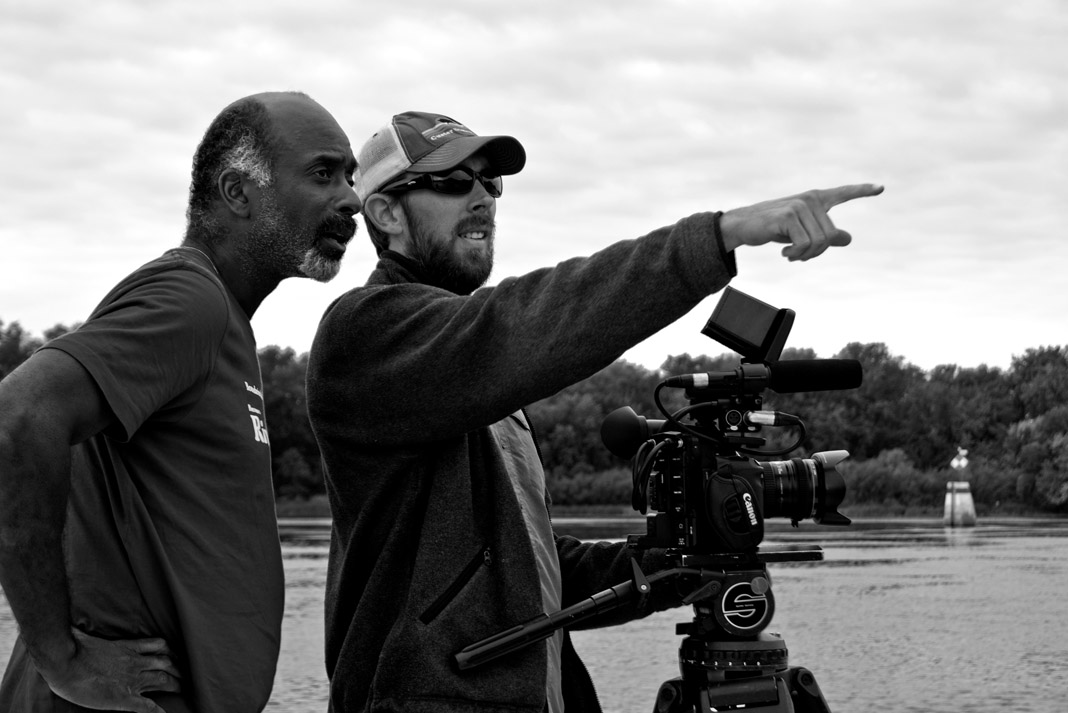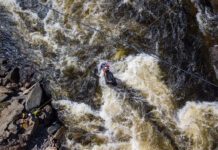Ifirst read Adventures of Huckleberry Finn when I was 12 years old. As a young reader, Huckleberry Finn was the every kids’ kid, motivating a number of lashed-together raft attempts in the small swampy pond behind my Grandpa’s farmhouse. I didn’t understand at the time that Huckleberry Finn was not really about a river trip at all. In this tradition, Mississippi Solo (available on Amazon) is the account of an epic source-to-sea trip by Eddy L. Harris, but the true focus of his celebrated memoir is on much weightier topics.
Mississippi Solo is about more than a river trip
Seeking adventure but missing the point
Huckleberry Finn, Mark Twain’s sequel to The Adventures of Tom Sawyer is considered one of the classics of American literature and is hands down the most popular river story of all time. It has sold an estimated 20 million copies since first published in 1885.
I had yet to even sit in a canoe by the time I had read Twain’s novel, yet it instantly shaped my view of adventure, the Mississippi River and what a river trip should look like. In the early ‘90s I was in my early 20s, full time guiding, and voraciously collecting anything and everything to do with river lore. I lived out of a tired Chevy Sprint hatchback, half of which was filled with milk crates of river books.
From my dirtbag library I would loan novels and guidebooks to other guides. I’d bring copies on my river trips. I’d read aloud to my guests as we floated between deep canyon walls. I’d reference others for river facts and quote memories of early explorers on the same rivers.
In this time of collecting all things river, I stumbled upon an unlikely young author named Eddy Harris and his book, Mississippi Solo. Eddy was a self-declared total neophyte. He’d borrowed a canoe, hitched a ride with a friend to Minnesota, and proceeded to travel the entire length of the Mississippi River to New Orleans.
He paddled over 2,000 miles, eating in diners, camping in city parks, probably even changing sides every couple of strokes. I was left nonplussed by the book. Puzzled. Disappointed. It didn’t seem like an adventure to me. I totally failed to relate to Harris’ story.
What I didn’t understand at the time—not until rereading it decades later—Mississippi Solo was not about a river trip at all.
A closer reading of Mississippi Solo
Exactly 30 years after its 1988 publication, I again stumbled upon Mississippi Solo, pushed to the shadowed and dusty end of my basement bookshelf.
Rereading it now—I will optimistically attribute this to accrued wisdom, or at least just being closer to 50 rather than 20—I had my Huckleberry Finn moment. Eddy Harris, while telling the story of his novice canoe trip, was really writing about race and being a young Black man in America. It feels ridiculous to me how this was not more apparent the first time I read it. But then again, Adventures of Huckleberry Finn is about race and racism and I managed to miss that too on the first time around.
Imagine launching in 1988, as Harris puts it, “From where there ain’t no Black folks to where they still don’t like us much.” Let alone doing so in a craft about which the author knew little to nothing. This was adventure in a realm I could not fathom as a young, hard-skilled, self-absorbed white guy. Today, Eddy’s adventure impresses me completely.
I was so inspired I picked up the telephone and cold called Eddy Harris. This is not something I would typically do, and graciously, he was happy to talk with me.
Harris gets to the heart of the matter
As it turns out, Eddy had just returned from a second source-to-sea trip along the Mississippi River, this time interviewing people for his film, River to the Heart (see the trailer on YouTube).
What struck me about my conversation with Eddy is the sense of ownership he has for his river, the Mississippi. He explained to me how his film was an extension of this ownership:
“Part of the rationale for the film, and talking to kids of color, is that this river, nature, the country, is ours too. The racial component is very important. Unless we feel a part of it, we won’t consider it. Part of my schtick is to push inclusion so we all care about the same things. No matter what color we are.”
Harris claims he had no idea Black people didn’t canoe. It didn’t occur to him until he was on his trip. He wrote in Mississippi Solo, “I promised myself I would not make race an issue out here…but it became clear people will see I’m Black only moments after they see my canoe is green. Maybe even before.”

Inspiring ownership of the outdoors
This tension of being a newbie canoeist, an outsider, a traveler and a Black man, set against a sense of ownership of where he was, on his river, is the most powerful aspect of his story. Eddy explained to me, “I never saw my being Black as an impediment to what I can or cannot do. I’m hoping the canoe in Mississippi Solo inspires the same sense of ‘it’s mine’ ownership.”
“Part of the rationale for the film, and talking to kids of color, is that this river, nature, the country, is ours too.”
“Once you feel ownership, you don’t restrict yourself from it. The canoe becomes a metaphor for this sort of ownership. The Mississippi River, too, everyday on the river you realize, ‘this is mine’. The locks and dams, they pass you through like everybody else because they are ours. This river belongs to me too.”
Now in his 60s, Harris is back doing it again. He’s setting out on another 2,000-mile journey. “The first time, I had no idea what I was doing. It was a real pilgrimage. The second time was different, because I was with this camera crew. I feel the need to do the solitary journey again. It’s my home river.”
The story runs deep in Mississippi Solo
Rereading Mississippi Solo I learned more about my limited perspective and what is says about me and my place in society. Just like Twain’s Adventures of Huckleberry Finn, and like always, if you look deeper into the waters you travel past you’ll discover there is always more to the river than just the river trip.
This article was first published in Issue 55 of Paddling Magazine. Subscribe to Paddling Magazine’s print and digital editions, or browse the archives.
Jeff Jackson is a professor at Algonquin College and a risk management consultant. Eddy—he insisted upon Jackson calling him Eddy—now lives in France and is a critically acclaimed author with several titles to his name. More information can be found at Eddy’s website, www.eddyharris.com.







